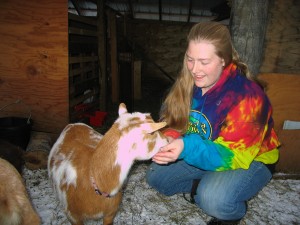Regulations get farmer’s goat
November 9, 2010
907-474-5402
11/9/10
When one of her children began having allergic reactions to cow’s milk Heidi Livengood took a good long look at raising goats. She liked what she saw. Livengood now has 15 Nigerian dwarf goats and two Angoras.
She previously raised heritage turkeys, chickens and ducks but when a nearby property owner in her Steele Creek neighborhood complained about the critters she phased out most of the fowl from her menagerie, keeping only a goose and a chicken or two. “I would love to do it again,” she said.
Looking on the bright side, she said now she has more time to concentrate on goats. Being a mother of six who had major surgery recently, time is of the utmost importance to Livengood. “I’ve had to prioritize,” she said. And, yes, the goats are a priority.

Having access to goat milk is important to the family, not only because of allergies but because of the healthy qualities of the milk overall. “Everybody that tries it says wow,” Livengood said. Milk from Nigerian goats has 6 percent butterfat and a slightly sweet flavor, she explained. For her family’s use, she prefers to leave the milk raw, since it lasts twice as long as pasteurized.
Growing up in Fairbanks as the eldest of six, Livengood was the one chosen to milk animals twice a day in an unheated barn, a chore she sorely resented as a teenager, but one she enjoys these days. She was in 4-H for nine years, but didn’t study animal care. “I learned about fashion revues,” she said. She later became a 4-H camp counselor.
After earning a certificate in architectural and civil drafting at UAF, Livengood helped her husband Ben build the family home on three acres. “I’ve always been interested in getting goats so I wanted extra land,” she said. “Now I wish we had more.” Goats are amazing creatures in Livengood’s eyes. “They are better than dogs,” she said. “They follow you everywhere and they love you. Sometimes they even do what you say, if you have food.”
Strolling into the pens with buckets of pellets on Monday, Livengood and her little girl Charity were met with enthusiasm. Calling out to each animal by name, they shook their heads at the antics of the billy goats. Livengood would like to have a goat milk and cheese business but is stalled because only Grade A dairies are allowed to sell milk in Alaska.
One option may be to offer goat shares, where members own part of a goat and could then legally purchase milk, or to have customers buy an entire goat that would stay with the Livengoods for care and feeding. “There are so many legal hoops that we really can’t find a way to prevent ourselves from being liable,” she said. “We can’t afford to be taken to court.”
Another kink is their animals are shown at fairs and goat associations so they have to be wholly owned by the person showing them. “It gets really complicated,” Livengood said. She has been experimenting with making mozzarella, feta and ricotta cheese and really likes the results. Also, she is learning to spin angora fiber, which can be sold for doll hair or other products. “Everyone has to have a hobby,” Livengood said. “You can’t stay sane unless you have something to keep you busy. It’s fulfilling.”
She longs for the day that raising goats becomes sustainable because it costs so much to buy the feed in Alaska. “We’ve done very well selling kids,” she said. “A lot of people want to have their own milking goat.” When she sells an animal she sends the new owner off with tips and advice and tells them to call any time they have questions. She’ll even buy back the goat if it doesn’t work out.
Her goal is to freely be able to distribute raw milk to the community without fear of prosecution and to make and sell homemade cheese. Another dream is to take classes at the Vermont Institute for Artisan Cheese. “In Alaska we need to start pushing,” she said. “We need to tell the DEC (Department of Environmental Conservation) that goats’ milk is no more dangerous than buying a chicken at the store.”
She is vigilant about making sure her animals are disease free, drawing blood and sending it to be tested routinely. “If you are buying local milk make sure the animals are tested,” she advised. The interview closes as Livengood anxiously eyes a baby monitor connected to the garage. An expectant goat is due any minute and Livengood wants to be on hand for the birth. “I was up all night with her,” she said. “There are lots of things on my plate.”
474-0366
www.livingoodfarm.com474-0366heidi.livengood@gmail.com


